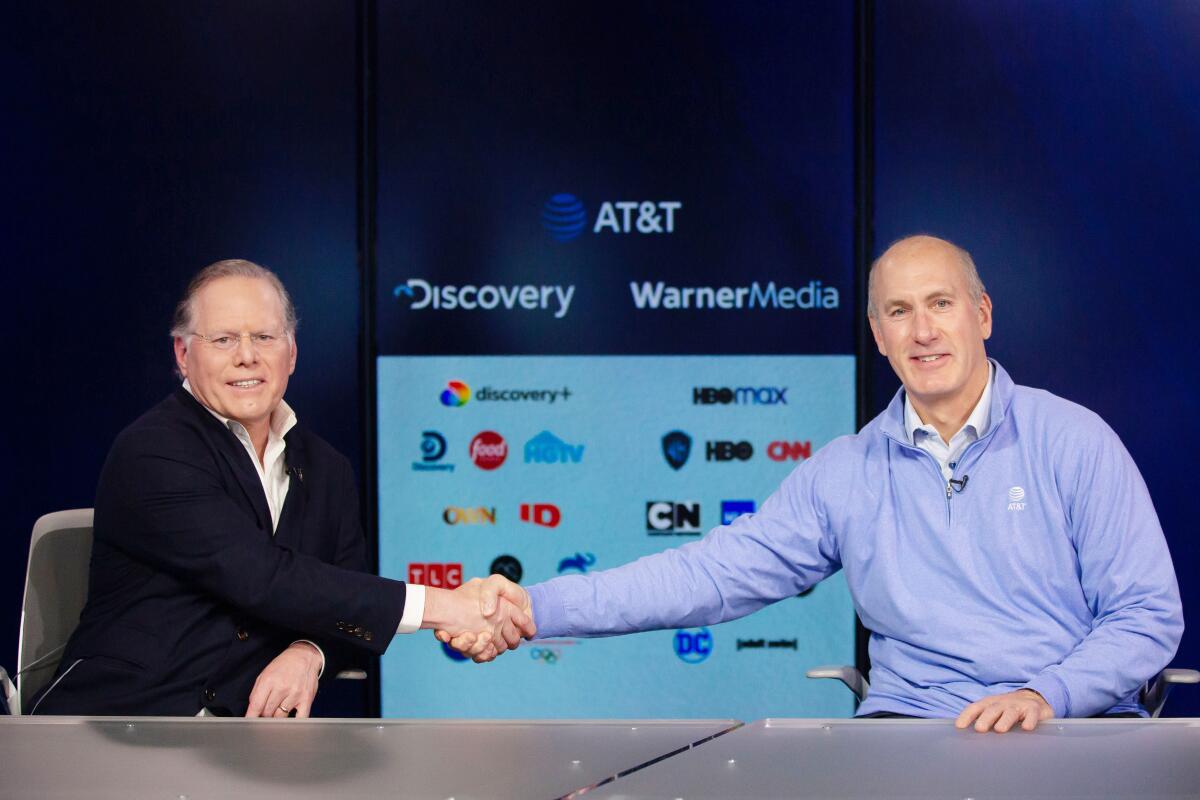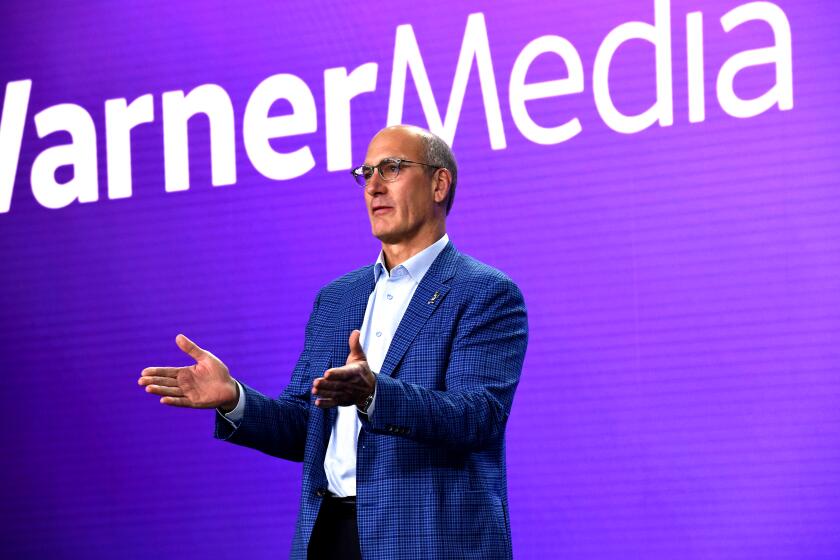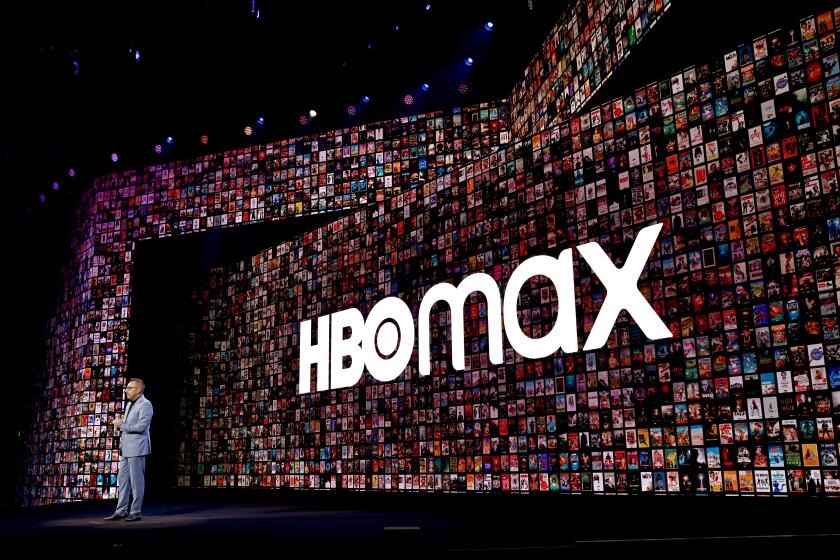Warner Bros. Discovery faces suit alleging inflated HBO Max numbers

Warner Bros. Discovery and its top corporate brass are facing a shareholder lawsuit that alleges false statements were made about the health of the HBO Max streaming service and its subscriber numbers to pave the way for a merger this year.
The proposed class-action lawsuit was filed last week in New York federal court by the Collinsville (Illinois) Police Pension Board, which held Discovery stock. The suit proposes to expand to include other Discovery shareholders who have watched the value of their holdings plummet after the $43-billion merger of Discovery and AT&T’s WarnerMedia unit.
Since the merger closed in early April, Warner Bros. Discovery stock has fallen more than 50%. Warner Bros. Discovery stock was trading for more than $25 a share in early April; on Wednesday, it closed at $11.79, up 4.15% for the day.
The merger was announced in May 2021 — one year after AT&T launched the HBO Max streaming service. AT&T had decided to make a hasty exit from Hollywood, just three years after paying $85 billion to acquire Time Warner Inc., the prior parent of HBO, CNN, TNT, TBS and the legendary Warner Bros. film and television studio in Burbank.
AT&T realized that it didn’t have the stomach for the big investments needed to compete in the streaming wars with tech giants, including Amazon and Apple, when the company also had to fund its expansion of its core wireless phone business.
As part of the merger transaction, Discovery and AT&T shareholders each received stock in the new company, Warner Bros. Discovery.
The lawsuit alleges Warner Bros. Discovery and its top executives, Chief Executive David Zaslav and Chief Financial Officer Gunnar Wiedenfels, violated Securities and Exchange Commission laws by allowing misleading statements to be contained in merger registration documents and a prospectus.
The suit contends that Zaslav, Wiedenfels and others had an obligation to alert Discovery shareholders to the problems before shareholders voted in March to approve the merger.
The 31-page lawsuit contends that AT&T’s WarnerMedia subsidiary “overstated the number of subscribers to HBO Max by as many as 10 million subscribers” because the Dallas phone giant included in the subscriber count AT&T customers who had received bundled access to HBO Max. But those AT&T customers had not signed onto the HBO Max service, the lawsuit alleged.
The companies are expected to announce their proposed joint venture as early as Monday, creating a new company that would reshape Hollywood.
After the merger, Warner Bros. Discovery acknowledged to investors that the “HBO Max streaming business had a high churn rate that made the business not ‘viable’ unless the churn rate was reversed,” the lawsuit said. “Churn rate” refers to the number of customers who sign up and then leave a service during a certain period of time, such as a fiscal quarter.
The entire streaming industry has been grappling with significant churn rates, which are dramatically higher than what the cable TV business had experienced.
Warner Bros. Discovery stock dropped in August when the company acknowledged a $3.42-billion loss in its second quarter, partly due to charges related to the merger. During that earnings report, the company acknowledged that it had adjusted its streaming service “subscriber definition,” and that 10 million AT&T Mobility subscribers were removed from the count.
Most entertainment companies saw their stock drop this past summer as Wall Street began to absorb the realities of the streaming business. Netflix’s struggles, including subscriber losses and high production costs, brought the issue into sharp focus. Amid the subscriber slump, Netflix eliminated 150 jobs in May.
Warner Bros. Discovery declined to comment on the lawsuit.
An AT&T spokesperson could not be reached for comment. AT&T was not named in the lawsuit.
“AT&T was overinvesting in WarnerMedia entertainment content for streaming, without sufficient concern for return on investments,” the lawsuit alleged. “WarnerMedia had a business model to grow the number of subscribers to its streaming service without regard to cost or profitability.”
Discovery CEO David Zaslav will run the proposed new company, which would bring together some of the best-known TV channels and Warner Bros. studio.
During the AT&T regime, “WarnerMedia was improvidently concentrating its investments in streaming and ignoring its other business lines,” the lawsuit said.
Now those businesses are getting squeezed.
Since the merger, Warner Bros. Discovery has been laying off hundreds of staffers to meet its promise to Wall Street that it would find $3 billion in cost savings.
As part of the WarnerMedia-Discovery merger, more then 700 million Warner Bros. Discovery shares were issued to Discovery common and preferred shareholders.
The lawsuit, which was first reported by the Wrap, is being handled by Robert C. Finkel of the Wolf Popper LLP law firm in New York.
More to Read
Inside the business of entertainment
The Wide Shot brings you news, analysis and insights on everything from streaming wars to production — and what it all means for the future.
You may occasionally receive promotional content from the Los Angeles Times.













